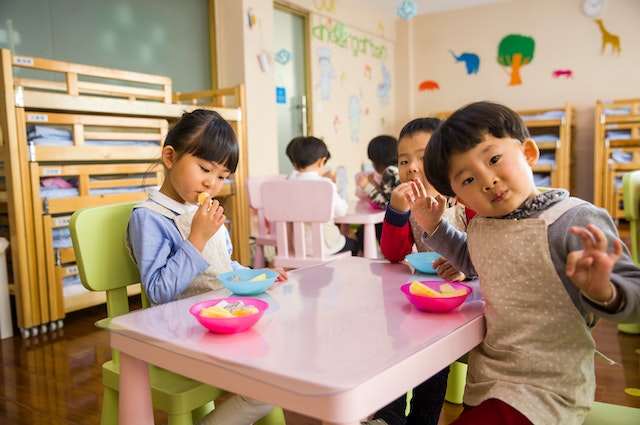No matter where a child goes to daycare, preschool, or kindergarten, their time with teachers and caregivers can have lasting benefits for cognitive development. Studies have linked high-quality daycare providers with reduced behavioral issues and greater school readiness.
Different daycares utilize various approaches, but most promote the development of social skills, self-control, and other key capabilities essential for lifelong success.
Social and Emotional Development
Daycare centers provide children with an ideal setting to develop their skills by offering safe spaces with appropriate materials and caregivers in an encouraging, comfortable environment. Children have opportunities to interact with others and learn from peers as they play together and have fun while fostering social-emotional development that impacts self-esteem, confidence, empathy, and the capacity for creating strong and lasting relationships with peers and adults alike.
Emotional literacy, or children’s ability to recognize and name their own emotions as well as those of others, is an integral component of social-emotional development. However, starting daycare too early can also have some negative side effects.
Children need to regulate their behavior, empathize with others, solve problems effectively, and make decisions more easily. Daycare educators prioritize developing these key emotional-social skills through activities, games, and conversations in the preschool environment. But it is only effective if done on the right way and schedule.
Children also learn to respect and trust adults during their time at daycare, which will serve them well when entering formal education institutions and meeting teachers and staff members for themselves. Children who had positive interactions with adults early on are more likely to recognize them later as role models they can look up to as leaders they can look up to later.
Daycare provides children with an ideal setting in which they can learn socialization skills and make friends, making life easier for busy parents who may otherwise find it challenging to arrange playdates or help their child meet new people.
Children exposed to various germs at daycare can strengthen their immune systems, helping prevent frequent illnesses that would otherwise frustrate families and interfere with learning. Kids who do not attend daycare tend to take more sick days in elementary school, which leads to reduced academic performance.
Research is ongoing, but preliminary evidence indicates that children who spend more hours at daycare appear to experience fewer social-emotional issues later in life than those who don’t attend as often. This could be attributed to consistent caregiving and routines, as well as having access to supportive communities of peers that help manage emotions better than anyone else can. Regardless, it would still be wiser for you to limit daycare hours during their first year of life.
Physical Development

Children need plenty of physical activity to develop their motor skills. Through activities like tummy time, crawling, sitting up, walking, climbing, jumping, running, and skipping, they can build muscle mass while also building strength, endurance, self-confidence, and coordination. A high-quality childcare program will ensure your kids are getting enough exercise.
Daycare provides toddlers with a structured environment, which is essential when learning how to behave in groups. They’ll begin to recognize adults as resources and trust them, giving them a positive view of school and authority figures, which will serve them well later when developing healthy relationships with teachers or professionals.
Daycare schedules offer more than structured times for playing, eating, and napping; they also feature many opportunities for outdoor play activities that allow your child to stretch his/her big muscles while engaging creatively and discovering more of the world around them. Playing outdoors helps build their confidence as they build resilience against challenges or risks they might face later.
Active play helps children produce endorphins, the natural feel-good chemicals produced by their brain, which have been linked with memory, learning, and concentration. When they arrive at daycare, they’ll be better capable of paying attention during lessons and concentrating.
Studies have established the connection between quality childcare and children’s cognitive development, with infants attending daycare being more mature and having better behavior as teenagers than those staying home with their parents.
Kids attending daycare are exposed to an assortment of germs that help build up their immunity, protecting them from getting sick more frequently at home or missing school days—benefits that should be carefully considered by every family. A good daycare should always be considered.
Cognitive Development
Kids at daycare get the opportunity to explore their interests and develop creativity within a structured environment, something that child development experts recognize as essential to cognitive growth and knowledge acquisition. When attending high-quality childcare centers, they also get exposed to different ways of thinking which help develop problem-solving abilities which will benefit them later in life; often using their imaginations creative solutions are found for issues they come across on an everyday basis; such creativity is highly prized within workforce environments.
Children in a quality daycare environment will also learn to respect adults. They’ll see their care providers as resources who can guide and support them as they achieve their goals, helping to foster positive relationships with teachers and other authorities later on in life. Children exposed to multiple positive role models are likely to develop greater self-esteem and confidence than their counterparts who do not.
Studies have revealed the significance of daycare quality on cognitive development for children. According to research by the Eunice Kennedy Shriver National Institute of Child Health and Human Development’s Study of Early Childhood and Youth Development (SECCYD), children in high-quality childcare programs had comparable outcomes as children whose parents were their primary caregivers.
However, it can be challenging for families with nontraditional work schedules and shift work patterns to afford premium quality daycare centers staffed by educators with teaching degrees who possess extensive experience working with children.
The study discovered that the key element in children’s cognitive development was not how long they spent at daycare but rather the quality of interactions between a child and his or her caregiver, including frequent back-and-forth conversations tailored to each child’s developmental needs. Such interactions are more crucial than any structure of care, including physical, social, or community aspects or contextual influences.
Researchers have investigated three tiers of factors that predict children’s cognitive development and academic achievement: first is the caregiver relationship; second is day care structure and thirdly the community context. There is strong evidence that high-quality child-care environments have positive effects on cognitive development and academic achievement.
Language Development
Many developmental psychology experts concur that children learn best by interacting with both their caregivers and peers – this is why daycare is such a beneficial resource for kids! Daycare helps build their confidence and independence within society – two key components of healthy development.
One of the greatest contributions daycare can make to your child is aiding in the development of their language skills. Language development is vital to cognitive and social development; therefore, it should begin early. Children absorb everything around them, such as words or sounds they hear. Talking to your kids, reading to them, or labeling objects can all support language growth, though remembering that each child will reach milestones at different times is crucial to supporting language acquisition.
When speaking with your children, make sure that you use simple vocabulary and pronounce each word accurately. Listening to what they have to say without interrupting is also crucial – don’t make fun of their errors but gently correct them instead, encouraging them to keep trying!
Toddlers typically can speak in phrases by the time they reach two years old and express their needs, wants, and emotions clearly to their parents or caretakers. This milestone marks an achievement and shows they possess the necessary language abilities to communicate with you and others effectively. It’s essential that we support their language development by reading together, discussing topics they find interesting, or engaging in other playful activities with them.
Many speech pathologists believe that giving your children lots of verbal input and listening to them talk is essential for language development. You can do this by conversing with them, asking questions about their vocalizations, responding to vocalizations with questions of your own and engaging them in imaginative play – making up stories or acting out what they see daily!




